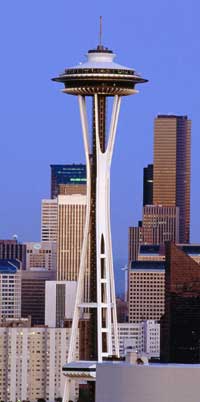Jul 10 2008
Seattle's famed Space Needle is making a concerted effort to be the best in the Pacific Northwest when it comes to saving our environment, announcing today a significant initiative to "go green." This program, already having seen much success, entails many initiatives -- several of which have already been fully deployed. It encompasses several focal points of the 'green movement,' including an ultra-innovative water filtration system that will amaze even native Northwesterners.

"Seattle is already an environmentally-conscious community, and as a symbol of that community, it is natural to take the lead and exemplify what is becoming only more and more important to our lives," said Peter Beck, Vice President of Operations at the Space Needle. "It isn't a matter of taking the first step to 'go green' anymore -- it's a matter of going above and beyond."
The initiative includes efforts around water, recycling and energy conservation among other things, each aiming to reach new heights through various vendor partnerships.
Water
Perhaps the most innovative of the 'green' updates is the Space Needle's new water system at SkyCity at the Needle, the icon's renowned revolving restaurant. Having done away completely with bottled water, SkyCity is leading the way for other large-volume restaurants. While the Seattle area is already fortunate to be surrounded by excellent natural water sources -- only 35 parts per million total dissolved solids (PPM) -- the Space Needle is challenging this standard by using the highest quality filtered water. This water system was custom designed to produce water with zero parts per million of total dissolved solids. All water and ice served in the restaurant are filtered using this system. Both still and sparkling filtered water are now offered to guests, resulting in glass and delivery fuel savings.
Recycling
Cedar Grove Composting, a family-owned organic recycling company with roots in the waste management business dating back to 1938, has implemented a comprehensive composting system that incorporates recycling food waste and a variety of products and materials throughout the Space Needle. Food waste composting has proven to be infinitely successful in all areas. Before the recycling program was advanced, 17 percent of overall waste was recycled. Currently, it now stands at 53 percent and is still improving.
Energy Conservation
In an effort to significantly reduce the amount of energy used by the Space Needle, many processes have been exchanged for more efficient ones. Compact fluorescent bulbs have replaced incandescent bulbs, resulting in 73 percent energy savings at each of these fixtures. Cold cathode lights in the Space Base gift shop have been replaced by T5 fluorescent bulbs with ENERGY STAR-rated electronic ballasts, providing greater illumination and 25 percent energy savings. Additionally, ENERGY STAR LED exit signs have resulted in an estimated 64 percent energy savings and new, energy-efficient light fixtures were installed in a portion of the core stairwell in April 2008, resulting in 86 percent energy savings.
Also, a new, more efficient hot water system has been installed in the Top House, including all new plumbing and state of the art hot water pipe insulation. This has resulted in an estimated 30 percent improvement in energy efficiency for the system as a whole.
Green Cleaning Program
Metropolitan Building Maintenance has implemented its Green Cleaning Program within the Needle, using only environmentally-gentle and sustainable cleaning products and techniques. Alpha HP, an all-in-one, environmentally-friendly multi-surface cleaner with low levels of hydrogen peroxide, is being used in all areas of the Needle. This innovative product is Green Seal certified and meets Green Seal's environmental standard for industrial and institutional cleaners. Additionally, no carcinogens are added. It is non-combustible and contains low VOC (Volatile Organic Compounds) content, making it much safer for the both the environment and for those using the product.
Dishwashing Grease Interceptors
Grease interceptors have been installed in three different kitchens (cost: $40,000) to separate all grease from dish and pot washing, preventing contamination of the sewer system. The grease is then recycled.